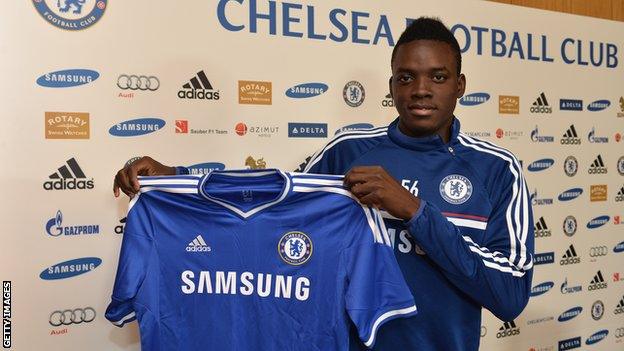Chelsea transfer ban: Fifa punishment 'after 150 rule breaches involving 69 academy players'
- Published

Bertrand Traore signed his first professional contract at Chelsea in 2013 at the age of 18 but was not registered until January 2014
Chelsea were given a transfer ban after 150 rule breaches involving 69 academy players over several seasons, says a judgement published by Fifa.
The two-window ban, which ends in February 2020, was upheld by the world governing body in May after an appeal.
New details of the case came to light after being published on a Fifa legal website, external on Thursday.
It shows how Chelsea claimed many academy players were only trialists and did not play in organised matches.
But one player described in this way took part in 75 games between September 2013 and February 2016.
Chelsea have lodged an appeal against the punishment, which also included a £460,000 fine and came after an investigation into the Premier League club's signing of foreign under-18 players, at the Court of Arbitration for Sport.
It is understood that the transfer ban was as a result of 27 breaches of Fifa rules, with others considered administrative or procedural.
The case came to light after claims Burkina Faso forward Bertrand Traore - who moved to London from his homeland - played for the Blues for several years before being registered in 2014.
Fifa bans the transfer of under-18s to different countries unless they meet strict criteria, such as the parents moving to the country for non-footballing reasons.
The rules were introduced to help protect children from exploitation and trafficking.
In its appeal, Chelsea said: "The Fifa disciplinary committee wrongly found that the Premier League Games Programme (PLGP) constituted organised football.
"Such football at the foundation phase (under-nine to under-11) and youth development phase (under-12 to under-16) of the PLGP is developmental friendly training football, formally arranged and structured, with a wide array of variable features."
However, Fifa said: "The committee has no doubt that the PLGP matches referred to in the appealed decision were organised under the auspices of the Football Association."
It added: "According to the explanations provided by [head of youth development] Mr Neil Bath, a trial for overseas players would consist of three to four visits that can last up to three weeks each if they occurred during school holidays.
"Therefore, it could take up to 12 weeks for a player to finalise a trial with Chelsea."
Fifa said "several players" spent "considerably" more time with Chelsea than this and took part in "organised football without being registered" for the Stamford Bridge club.
"The committee firmly believes that this type of conduct cannot be tolerated," the governing body added.